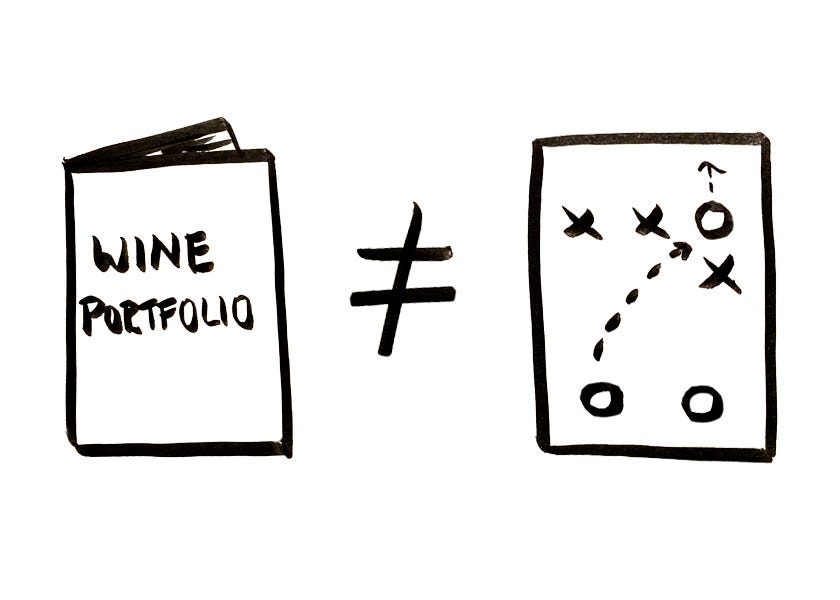On Fantasy Football and Selling a Portfolio
There's more to managing your products than selecting them
It’s fantasy football draft season. I know this because my partner has spent the past few days prepping and practicing.1 Even if she manages to get all her top choices, she’s a far way off from the playoffs.2
She must figure out how who to play and who to bench. She needs to do more than pray her players don’t get hurt. She needs to get lucky in her match-ups and adjust when things don’t break her way.
In short, she needs a plan. Her draft is part of a grander strategy, but it’s the tactics she employs over the next several months that will ensure success or spell failure.3 Having a good team matters only as much as your ability to capitalize on their strengths and minimize their weaknesses.
This is true for fantasy football teams. This is true for teams of salespeople. It’s true for wine and spirit portfolios. Possessing a great portfolio doesn’t hurt an importer or wholesaler, but it is no guarantee of success.
Even a fantastic portfolio doesn’t sell itself. It might make selling a tad easier. It might, in part, motivate the sales team, but it doesn’t do the heavy lifting.
It is common to hear salespeople debate the pros and cons of various portfolios. “This company just scored X Winery. What a pick-up!” “Y Wholesaler just lost Z brand. You know that can’t be good.” This is wasted breath.
Quality is not the same a resonance. Size is not the same as relevancy. A portfolio is not a plan.
As Alan Watts remarked, “The menu is not the meal.”4
A great portfolio demands an equally great plan executed by expert storytellers, caring salespeople, and empathetic customer service.5 To say there are a lot of moving parts only begins to describe the complexity of the system. This is why a plan is so important. It is a compass. It lets everyone navigate around a portfolio without the need for hand-holding, micromanagement, or demeaning infantilizing.
A simple plan in service to a portfolio lets each stakeholder know:
What their responsibilities are to the book
What tools they have at their disposal to fulfill those responsibilities
What comes next so they know how best to expend their efforts
When a new sales rep joins a company, one of the first things they’re given is a portfolio. They’re lucky if they work for a company that also gives them a plan.6 The two should be inseparable.
Without a plan, what happens when you run out of a popular item? Without a plan how can reps reasonably expect to know which of the 22 new SKUs introduced this month they should be focusing on?
Don’t handicap your portfolio by letting others make decisions in absence of a plan. In fantasy football, you need to do more than draft your team. Every week you go in and set your line-up. That’s your plan. No one would dream of picking a team and letting things ride. If it’s not good enough for a fantasy football team, it won’t do for your business.
I have not. I have no connection to the sport of football save for a half-assed attempt to play in middle school. It did not go well. Practices were in the early evening and, it being late August in New Jersey, hot. One day my not-so-wise seventh-grade self decided I was hungry enough to indulge in an early pre-practice dinner. I was not quick enough to remove my helmet when the vomiting began. That was the beginning of my inaugural and final season.
Last year she didn’t make the playoffs. After reading her a draft of this piece, I’ve been assured that this year would be different.
Again, I’ve been told, nay warned, that the latter is not an option.
I prefer this derivation to the original Alfred Korzybski remark “The map is not the territory.” If you’re really taken by this theme, geek out on Jorge Luis Borges’ single-paragraph short story “On Exactitude in Science.”
At smaller companies, these can often be the same person.
Don’t confuse most of what’s said at general sales meetings as a plan.

